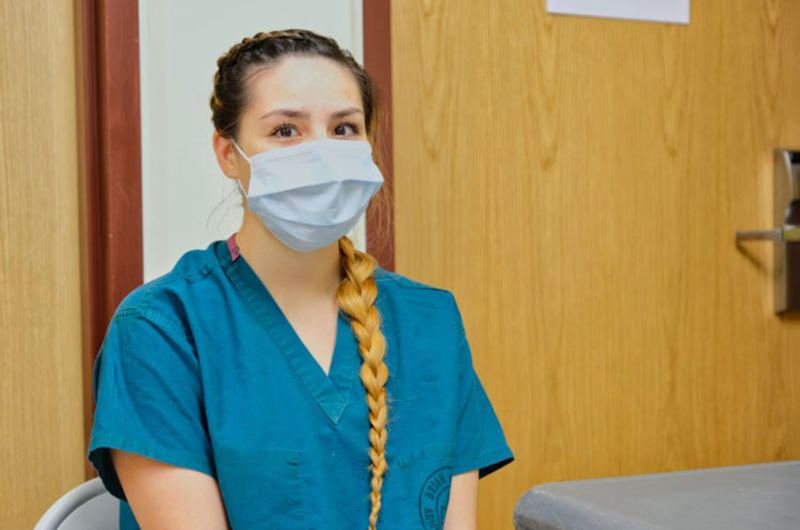South Korea-based soldier with coronavirus keeps positive attitude while in isolation

Pfc. Victoria Tolley, an Eighth Army soldier who tested positive for the coronavirus in late March, speaks to Stars and Stripes inside the isolation facility at Camp Humphreys, South Korea, Thursday, May 7, 2020.
By Kim Gamel | Stars and Stripes May 10, 2020
CAMP HUMPHREYS, South Korea — Army Pfc. Victoria Tolley considers herself fortunate even though she has been largely isolated in a barracks room for six weeks after testing positive for the coronavirus.
Tolley, 23, who works on the computer help desk at Eighth Army headquarters on Camp Humphreys, was the second soldier to contract the virus on the divided peninsula.
But the Sitka, Alaska, native is more worried about friends at home as the U.S. economy has been hit hard by the pandemic.
“Everyone keeps asking me if I’m OK and if I’m angry at the person who passed this on to me. I really don’t have it bad though,” Tolley told Stars and Stripes in an exclusive interview on Thursday.
“One of my best friends called me in tears because she had been laid off from her job because of this whole COVID thing,” Tolley said. “It kind of gave me a new perspective.”
Feeling ‘invincible’
Tolley was confirmed to have the virus on March 26, two days after an American contractor who worked in the same building tested positive. Another contractor at Eighth Army headquarters tested positive on March 27.
Military officials have said she probably got the virus from one of the other cases because of the timing and the fact that she had not been off base due to anti-coronavirus restrictions that include a ban on dining at local restaurants and bars.
Tolley, who was a contractor in Okinawa, Japan, before enlisting in the Army 13 months ago, said she understands.
“Who knows where that person contracted the virus,” she said. “They just know that they ended up getting it, and shortly after I got it, as well as another contract worker in the same office.”
U.S. Forces Korea has reported 27 confirmed cases since an outbreak began in South Korea in late February, but only three were active-duty service members. The others were military dependents, contractors and other U.S. and South Korean civilian employees.
Tolley has been housed at a newly constructed barracks that was repurposed as an isolation facility with negative pressure rooms to accommodate coronavirus patients.
Lt. Heather Craige, a registered nurse with the 125th Medical Detachment, said each patient is assigned to a single suite, although families may be kept together if everybody is infected.
“Any serious cases go to the hospital, but the hospital only has so many negative-pressure isolation rooms,” she said on Thursday.
Staying positive
With her long hair in a braid, Tolley wore scrubs and a surgical mask during the interview in a separate room at the barracks. Visitors donned protective clothing including gloves, hospital gowns, shoe coverings and plastic face shields.
Tolley, who arrived for her assignment in South Korea on Feb. 16, said she didn’t take the coronavirus threat seriously until she was confirmed to have it.
She began to feel tired and slept a lot after she and others who had been in contact with the infected contractor were sent home as a precautionary measure.
Tolley said she called the medical coronavirus hotline, but was cleared to return to work.
“When I got to work my NCO was like ‘you do not look good’ and told me to call the hotline again and to go get tested at the clinic,” she said.
She was placed in quarantine to await the results.
“I pretty much never get sick so maybe I had this false belief that I was sort of invincible to it,” she said. “I’m still kind of in shock even though it’s been six weeks.”
She said her symptoms included fatigue, a cough, a sore throat, chills and shortness of breath. She also lost her appetite and sense of taste and smell.
“It felt like the flu and mono combined. The only symptom I didn’t have was, I never got a fever,” she said.
The staff frequently checks her vitals, and she’s tested for the coronavirus every 72 hours.
“The nurses here have been pretty amazing,” she said. “I’m grateful for the people that are putting themselves at risk of exposure every day to care for me and the other patients.”
She received her first negative results on Wednesday, but the next test came back positive, so she continues to wait.
USFK requires patients to have negative results from two coronavirus tests at least 24 hours apart, no symptoms for at least seven days, no fever without medication and clearance from a medical provider for release.
Tolley said she reads her Bible every day and tries to take advantage of the time for self-reflection. She’s also allowed to go outside for limited periods to a roped-off area in the courtyard for fresh air.
“I feel blessed that, you know, I’m still getting paid. I’ve gotten six weeks off of work to do some emotional processing, to reflect back on life,” she said.
What is she most looking forward to when she returns to normal life?
“It’s really just simple things like going on a run or going to get some good coffee and just being around other people,” she said. “You know, like things you take for granted every day.”
gamel.kim@stripes.com
Twitter: @kimgamel



